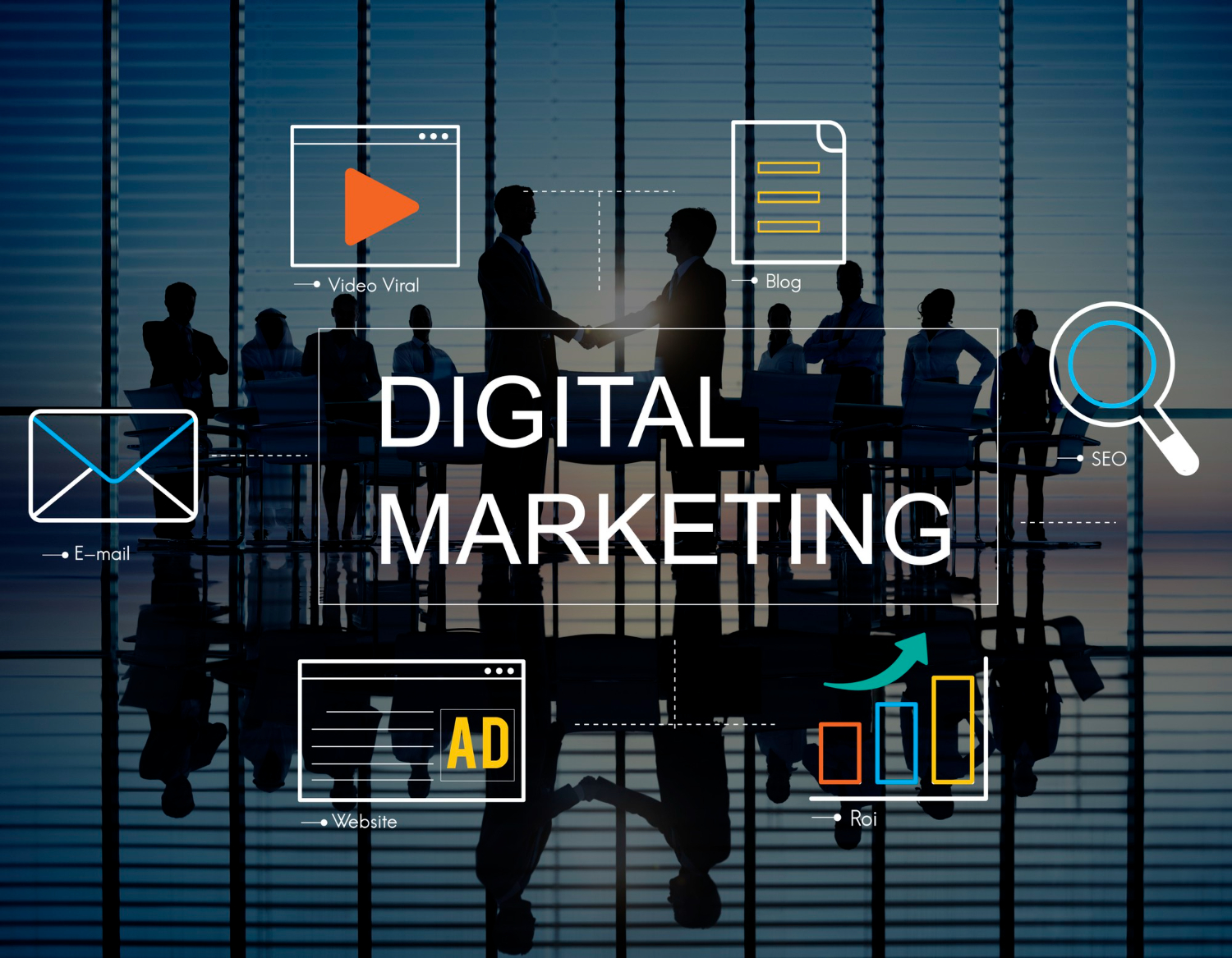In today’s digital age, building a personal brand online isn’t just an option; it’s a necessity. Personal branding allows you to establish a unique identity that resonates with your audience, sets you apart from the competition, and opens up numerous opportunities. Whether you’re an entrepreneur, freelancer, or professional looking to advance your career, a strong personal brand can be a game-changer. But how do you build this brand effectively? That’s where digital marketing comes into play.
Build a Personal Brand Online Through Digital Marketing
Digital marketing provides a plethora of tools and strategies that can help you create, manage, and grow your personal brand. From social media and content marketing to SEO and online reputation management, the digital landscape offers endless possibilities for establishing your presence and making your mark. This article will delve into the essential steps and techniques to build a personal brand online through digital marketing. We’ll explore the importance of a well-crafted personal brand, the foundational elements you need to get started, and the various digital marketing strategies you can employ to boost your brand visibility and influence.
By the end of this comprehensive guide, you’ll have a clear roadmap for developing a personal brand that stands out in the crowded online space. So, let’s dive in and start building your personal brand with the power of digital marketing!

Understanding Personal Branding
Definition of Personal Branding
Personal branding is the practice of marketing yourself and your career as a brand. It involves defining who you are, what you stand for, and how you want to be perceived by others. Unlike corporate branding, personal branding is about showcasing your unique qualities, experiences, and values. It’s about creating a narrative that highlights your strengths and expertise, making you memorable and trustworthy to your audience.
Benefits of a Strong Personal Brand
Having a robust personal brand offers numerous advantages. It enhances your visibility and credibility, making it easier for people to find you and trust your expertise. A strong personal brand can lead to more career opportunities, such as job offers, speaking engagements, and collaborations. It also helps you build a loyal following, which can be incredibly valuable if you’re looking to start a business or promote a cause. Moreover, a well-established personal brand can differentiate you from your competitors, giving you a significant edge in your field.
Common Misconceptions about Personal Branding
There are several misconceptions about personal branding that can hinder your efforts. One common myth is that personal branding is only for celebrities or influencers. In reality, anyone can benefit from building a personal brand, regardless of their profession or industry. Another misconception is that personal branding is about self-promotion and vanity. While self-promotion is a part of personal branding, it’s more about providing value to your audience and building genuine connections. Finally, some people believe that personal branding requires a lot of time and effort. While it does require consistency and dedication, the long-term benefits far outweigh the initial investment.
Also, Read – Using Emojis in Social Media Marketing: Dos and Don’ts
Setting the Foundation for Your Personal Brand
Identifying Your Unique Value Proposition
The first step in building a personal brand is identifying your unique value proposition (UVP). This is what sets you apart from others in your field. To determine your UVP, start by reflecting on your strengths, skills, and experiences. What do you excel at? What unique perspectives can you offer? Consider feedback from colleagues, clients, and mentors to gain insights into your unique qualities. Your UVP should be a clear and compelling statement that communicates the value you bring to your audience.
Defining Your Target Audience
Understanding your target audience is crucial for effective personal branding. Your audience consists of the people you want to reach and influence with your brand. To define your target audience, consider factors such as demographics, interests, and pain points. Who are they? What are their needs and challenges? How can you help them? Creating detailed audience personas can help you gain a deeper understanding of your audience and tailor your branding efforts accordingly.
Crafting Your Brand Story
Your brand story is the narrative that ties together your personal and professional journey. It’s a powerful tool for connecting with your audience on an emotional level. A compelling brand story should highlight your experiences, challenges, and successes. It should reflect your values and mission, and convey a sense of authenticity and relatability. To craft your brand story, think about the pivotal moments in your life and career, and how they have shaped who you are today. Share your story through your website, social media, and other platforms to engage and inspire your audience.
Creating a Professional Online Presence
Developing a Personal Website
A personal website is the cornerstone of your online presence. It serves as a central hub where people can learn more about you and your work. Your website should include an about page, portfolio, blog, and contact information. It should also feature a professional design that reflects your brand identity. Ensure that your website is mobile-friendly and optimised for search engines to enhance its visibility and accessibility.
Optimising Social Media Profiles
Social media platforms are essential for building and promoting your personal brand. Start by optimising your profiles on key platforms such as LinkedIn, Twitter, and Instagram. Use a professional profile picture and cover photo, and write a compelling bio that highlights your UVP and brand story. Consistency is key, so make sure your profiles align with your overall brand identity. Regularly post valuable content, engage with your audience, and participate in relevant conversations to build your online presence.
Importance of Consistent Visual Identity
A consistent visual identity helps reinforce your brand and makes it easily recognisable. This includes your logo, colour scheme, typography, and overall design aesthetic. Consistency in your visual identity creates a cohesive and professional look across all your online platforms. Use design tools and templates to ensure your visual elements are aligned with your brand guidelines. Remember, a strong visual identity can leave a lasting impression on your audience.
Content Marketing Strategies
Blogging and Guest Posting
Content marketing is a powerful strategy for building your personal brand. Blogging allows you to share your expertise, insights, and experiences with your audience. Write high-quality, informative, and engaging blog posts that address your audience’s needs and interests. Guest posting on reputable websites and blogs in your industry can also help you reach a wider audience and establish your authority. Be sure to promote your blog posts and guest articles through your social media channels and email newsletters to maximise their reach.
Creating Valuable Video Content
Video content is highly engaging and can significantly boost your personal brand. Create videos that showcase your expertise, provide valuable tips, and share your personal experiences. Platforms like YouTube and TikTok offer great opportunities to reach a large audience. Use a professional setup for your videos, including good lighting, clear audio, and a clean background. Regularly post videos and engage with your viewers through comments and live sessions to build a loyal following.
Engaging Through Podcasts and Webinars
Podcasts and webinars are excellent ways to share your knowledge and connect with your audience. Start your own podcast or participate as a guest on existing ones to reach a broader audience. Webinars allow you to provide in-depth information and interact with your audience in real-time. Promote your podcasts and webinars through your website, social media, and email list to attract participants. These formats also allow you to showcase your personality and build a deeper connection with your audience.
Leveraging Social Media Platforms
Choosing the Right Platforms for Your Brand
Not all social media platforms are created equal, and it’s important to choose the ones that align with your brand and audience. LinkedIn is ideal for professionals and B2B networking, while Instagram and Pinterest are great for visual content. Twitter is excellent for real-time engagement and industry news, while Facebook offers extensive advertising options. Analyse your audience demographics and preferences to determine which platforms will be most effective for your personal brand.
Building an Engaged Following
Building an engaged following requires consistency, authenticity, and interaction. Regularly post content that resonates with your audience, such as tips, insights, and personal stories. Engage with your followers by responding to comments, asking questions, and participating in discussions. Use hashtags strategically to increase your visibility and reach a broader audience. Collaborate with other influencers and brands to expand your reach and credibility. Remember, building a loyal following takes time, so be patient and persistent.
Utilising Social Media Advertising
Social media advertising can significantly boost your personal brand’s visibility and reach. Platforms like Facebook, Instagram, and LinkedIn offer targeted advertising options that allow you to reach your specific audience. Create compelling ad campaigns that highlight your UVP and drive traffic to your website or social media profiles. Monitor your ad performance and adjust your strategy based on the results. Paid advertising can be a valuable investment in growing your personal brand.
Also, Read – Email Marketing: Best Practices for Higher Open Rates
SEO and Personal Branding
Importance of SEO for Personal Branding
Search engine optimisation (SEO) is crucial for enhancing your online visibility and attracting organic traffic. By optimising your website and content for search engines, you can increase your chances of appearing in search results when people look for topics related to your brand. This can lead to more visitors, followers, and opportunities. SEO also helps establish your authority and credibility in your field, as search engines favour websites with high-quality, relevant content.
On-Page and Off-Page SEO Techniques
On-page SEO involves optimising the content and structure of your website to improve its search engine ranking. This includes using relevant keywords, creating high-quality content, optimising meta tags, and improving site speed. Off-page SEO focuses on building your website’s authority through backlinks from reputable sources. Guest posting, social media sharing, and collaborating with other websites can help you earn valuable backlinks. Both on-page and off-page SEO techniques are essential for a successful personal brand.
Leveraging Local SEO for Personal Brands
If your personal brand has a local focus, leveraging local SEO can be highly beneficial. This involves optimising your website and content for local search queries, such as including location-specific keywords and creating local business listings. Encourage satisfied clients and customers to leave positive reviews on platforms like Google My Business and Yelp. Local SEO can help you attract a local audience and establish your brand as a trusted authority in your area.
Networking and Collaborations
Building Relationships within Your Industry
Networking is a powerful tool for building your personal brand. Attend industry events, join professional associations, and participate in online forums and groups. Building relationships with peers, mentors, and influencers can open up opportunities for collaborations, speaking engagements, and referrals. Be genuine and approachable in your interactions, and focus on providing value to others. Networking can help you establish a strong support system and enhance your brand’s credibility.
Collaborating with Influencers and Brands
Collaborations with influencers and brands can significantly boost your personal brand’s visibility and reach. Identify influencers and brands that align with your values and audience, and propose mutually beneficial collaborations. This can include co-hosting events, creating joint content, or participating in cross-promotions. Collaborations can introduce you to new audiences, enhance your credibility, and create valuable connections. Be strategic in your collaborations and ensure they align with your brand’s goals.
Attending and Hosting Virtual Events
Virtual events, such as webinars, workshops, and conferences, offer excellent opportunities to share your expertise and connect with your audience. Attend virtual events in your industry to network and learn from others. Hosting your own virtual events can position you as a thought leader and attract a dedicated audience. Promote your events through your website, social media, and email list to maximise attendance. Virtual events allow you to showcase your knowledge, engage with your audience, and build your personal brand.

Monitoring and Managing Your Online Reputation
Tools for Monitoring Your Brand Online
Monitoring your online reputation is essential for maintaining a positive personal brand. Use tools like Google Alerts, Mention, and Brandwatch to track mentions of your name, brand, and keywords across the web. Regularly check your social media profiles, review sites, and forums for feedback and comments. Monitoring your online presence allows you to stay informed about what people are saying about you and address any issues promptly.
Responding to Feedback and Criticism
Receiving feedback and criticism is a natural part of building a personal brand. Responding to feedback in a constructive and professional manner can enhance your reputation and build trust with your audience. Thank people for their feedback, address any concerns, and take corrective actions if necessary. Avoid getting defensive or engaging in online arguments. Handling criticism with grace and professionalism can turn negative experiences into opportunities for growth and improvement.
Strategies for Maintaining a Positive Reputation
Maintaining a positive reputation requires consistency, authenticity, and proactive efforts. Regularly share valuable content, engage with your audience, and uphold your brand values. Address any negative feedback or issues promptly and professionally. Build relationships with your audience by showing appreciation and providing excellent value. Continuously monitor your online presence and adapt your strategies to maintain a positive and trustworthy reputation.
Also, Read – The Ultimate Guide to SEO for Beginners
Measuring Your Personal Branding Success
Key Metrics to Track
Tracking key metrics is essential for evaluating the success of your personal branding efforts. Some important metrics to monitor include website traffic, social media engagement, follower growth, content performance, and conversion rates. Use analytics tools like Google Analytics, social media insights, and email marketing reports to gather data and assess your performance. Regularly review your metrics to identify trends, strengths, and areas for improvement.
Analysing and Adjusting Your Strategy
Based on your metrics, analyse the effectiveness of your personal branding strategies. Identify what’s working well and what’s not, and make necessary adjustments to improve your results. Experiment with different content formats, platforms, and tactics to see what resonates best with your audience. Continuously refining your strategy based on data and feedback can help you achieve your personal branding goals and maximise your impact.
Celebrating Milestones and Achievements
Celebrating your milestones and achievements is important for staying motivated and recognising your progress. Share your successes with your audience, such as reaching follower milestones, launching new projects, or receiving awards. Celebrate both small and big wins to maintain a positive outlook and inspire your audience. Acknowledging your achievements can also enhance your credibility and reinforce your brand’s value.
Conclusion
Building a personal brand online through digital marketing is a rewarding journey that requires dedication, strategy, and authenticity. By understanding the fundamentals of personal branding, creating a professional online presence, leveraging content marketing and social media, optimising for SEO, networking, and managing your reputation, you can establish a strong and influential personal brand. Remember, personal branding is an ongoing process that evolves with you. Stay true to your values, continuously provide value to your audience, and adapt your strategies to achieve long-term success. Start building your personal brand today and unlock the countless opportunities that await you in the digital world.
FAQs
What is the first step in building a personal brand?
The first step in building a personal brand is identifying your unique value proposition (UVP). This involves reflecting on your strengths, skills, and experiences to determine what sets you apart from others in your field.
How important is social media in personal branding?
Social media is crucial for personal branding as it allows you to reach and engage with a large audience. Optimising your social media profiles, regularly posting valuable content, and interacting with your followers can significantly boost your brand visibility and influence.
Can personal branding help in career growth?
Yes, personal branding can greatly help in career growth. A strong personal brand enhances your visibility and credibility, leading to more job opportunities, promotions, and professional connections.
How often should I post content for my personal brand?
Consistency is key in personal branding. Aim to post content regularly, whether it’s daily, weekly, or bi-weekly, depending on your capacity and audience preferences. The quality of content is more important than quantity, so ensure each post provides value to your audience.
What are the common mistakes to avoid in personal branding?
Common mistakes in personal branding include lacking authenticity, being inconsistent, neglecting audience engagement, and failing to provide value. Avoid these pitfalls by staying true to your values, maintaining a consistent presence, engaging with your audience, and offering valuable content.
How can I collaborate with other influencers?
To collaborate with other influencers, start by identifying those who align with your brand and audience. Reach out with a clear and compelling proposal for a mutually beneficial collaboration, such as co-hosting events, creating joint content, or cross-promoting each other’s work.
What tools can help me manage my personal brand?
Several tools can help you manage your personal brand, including Google Alerts, Mention, and Brandwatch for monitoring mentions, Google Analytics for tracking website performance, and social media management tools like Hootsuite and Buffer for scheduling and analysing social media content.

